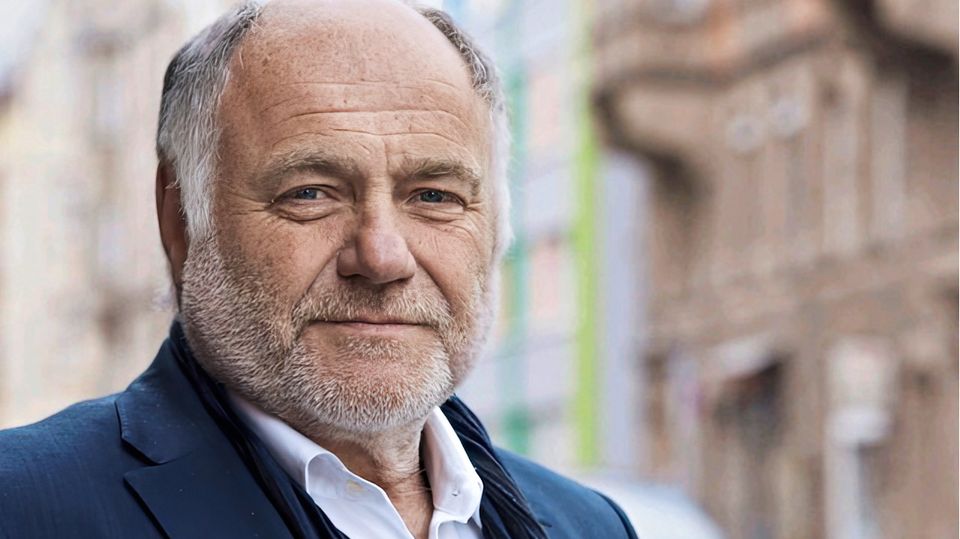According to the decision of the Constitutional Court
Union wants a new start with the heating law – and calls for a “serious procedure”
CDU party and parliamentary group leader Friedrich Merz criticizes the traffic light’s approach to the heating law
© Michael Kappeler / DPA
There will be no vote in the Bundestag, but the heating law is a topic in Parliament this Friday. The opposition is pushing for a new attempt and is railing against the traffic lights.
After the temporary stop of the Building Energy Act (GEG) by the The Federal Constitutional Court calls for the Union faction to restart the project. The decision is a serious defeat for the government of Chancellor Olaf Scholz (SPD), according to a motion by the parliamentary group, which Parliament should deal with on Friday morning. The application was submitted to the DPA news agency.
The court decision is also “an exclamation point for the right of MPs” to a thorough consultation of laws. It also shows that climate protection cannot be achieved with a crowbar.
The application goes on to say: “The heavy blow from Karlsruhe for the traffic lights must not become a lasting setback for climate protection. That’s why it’s not enough to simply push through the same law in a new procedure. Only with a fundamental new start on the matter can lost trust can be restored.”
Constitutional Court stops heating law for the time being
The Federal Constitutional Court had stopped the traffic light coalition’s plan to pass the so-called heating law in the Bundestag on Friday in an urgent procedure. Millions of homeowners and tenants have to wait until the beginning of September for clarity, then the SPD, Greens and FDP want to decide on one of their central projects for more climate protection.
The coalition factions emphasized that there should be no more changes in terms of content. SPD leader Lars Klingbeil told the editorial network Germany: “Citizens can now plan.” The law is scheduled to come into force on January 1, 2024.
“If more time is desired and required because the court determines it, then so be it. That’s no big deal either,” said Federal Minister of Economics Robert Habeck (Greens) on Thursday evening in the ZDF program “Lanz”.. The decisive factor is that no parliamentary group, not even the FDP, has moved away from the law. “I’m happy for the Union that it now has time to study the law again,” said Habeck.
dissatisfaction with the schedule
The stop by the court also sparked a debate about the fact that members of the Bundestag should be given more time for sometimes complex legal procedures. A CDU MP had applied for a temporary injunction because of the tight schedule in the legislative process.
The Union faction is now urging, among other things, for “serious procedures” within reasonable periods of time. The application also calls for “harmonizing a new building energy law with municipal heating planning and at the same time creating clarity about the promotion of private households when converting to ecological heating”.
There had been tough arguments for months about the controversial heating law. The FDP in particular had demanded fundamental improvements to the original draft law. Even before the first reading in the Bundestag, the traffic light agreed on further changes in mid-June, some of which were vaguely formulated in “guard rails” – a very unusual procedure that led to a first hearing of experts on the original draft law, which was already outdated at the time.
The coalition factions then submitted amendments to the original draft law to the Bundestag last Friday. This was followed by another expert hearing this Monday. The heating law should then be passed in the Bundestag on Friday. The opposition had heavily criticized the tight schedule.
The core of the heating law is that homeowners should have more time to replace the heating system, which should make a significant contribution to more climate protection in the building sector. According to the GEG, only heating systems that can be operated with at least 65 percent renewable energy in the long term may be installed in the future. From 2024 onwards, however, the regulations should only apply directly to new development areas.
Opposition complains about handling
The head of the CSU deputy in the Bundestag, Alexander Dobrindt, sees the cooperation between the coalition and the opposition as burdened. “We currently have a poisoned climate in the Bundestag that I have never experienced before,” Dobrindt told the editorial network Germany. “Every day we learn that the coalition factions have lost or even deliberately discarded any understanding of how to deal properly with the opposition. These atmospheric disturbances have an after-effect and leave lasting damage between the factions.” Union faction leader Friedrich Merz had previously made a similar statement.
heat pump, insulation, windows
There is money from the state for the house renovation
The “Rheinische Post” said the CDU chairman in the direction of Bärbel Bas: “Perhaps the decision of the Federal Constitutional Court is also an encouragement for the President of the Bundestag to pay more attention in the future to ensuring that the rights of individual MPs and minorities are better protected.” The Federal Constitutional Court has now taken over the work “that should actually have been done by Parliament itself”. Bas himself spoke on Thursday evening in the ZDF “heute journal” with a view to the decision of a serious warning.
The CDU/CSU parliamentary group failed on Wednesday in its attempt to set up a committee of inquiry in the Bundestag to investigate the tax scandal at Hamburg’s Warburg Bank. The coalition factions SPD, Greens and FDP voted against it. The process is absolutely unusual. Committees of inquiry are considered one of the most important minority rights in the Bundestag.


